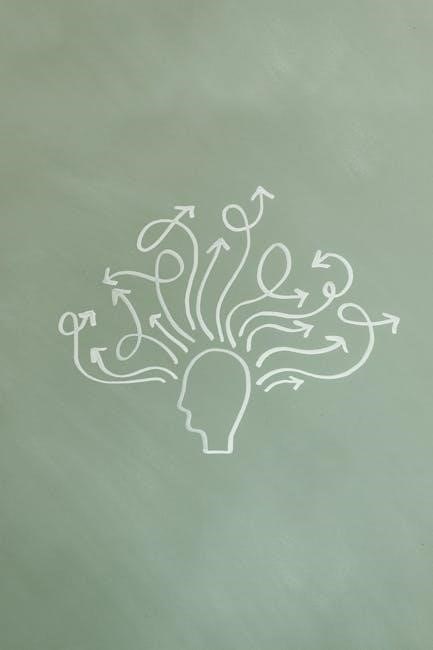the couple’s guide to thriving with adhd
Understanding ADHD in the Context of Relationships
ADHD impacts relationships uniquely, often leading to misunderstandings and emotional challenges. Melissa Orlov’s work highlights how ADHD affects communication, intimacy, and daily interactions, offering strategies to foster a calmer, more loving partnership.
1.1 Defining ADHD and Its Impact on Adult Relationships
ADHD, or Attention-Deficit/Hyperactivity Disorder, is a neurodevelopmental condition that affects focus, impulsivity, and hyperactivity. In adult relationships, ADHD often manifests as misunderstandings, emotional dysregulation, and challenges in maintaining intimacy. Melissa Orlov, a renowned marriage consultant, explains how ADHD can disrupt communication and create feelings of isolation for both partners. Common issues include inaccuracies in how messages are perceived, leading to conflict. For example, a partner with ADHD might mishear or misinterpret their spouse’s words, causing frustration. Additionally, ADHD can lead to inconsistent follow-through on commitments, which may result in feelings of unreliability. These challenges highlight the importance of understanding ADHD’s role in relationships and implementing tailored strategies to address its impact effectively.
1.2 Common Challenges Faced by Couples with ADHD
Couples affected by ADHD often face unique challenges that can strain their relationship. Emotional dysregulation, impulsivity, and inattention can lead to misunderstandings and frustration. Communication issues arise when one partner misinterprets the other’s words, causing conflicts. Time management and organization problems can also affect daily life, leading to unmet expectations. Additionally, intimacy may suffer due to difficulties in maintaining focus or emotional connection. Melissa Orlov’s work emphasizes that these challenges are not about love or commitment but rather about how ADHD impacts interactions. Recognizing these patterns is the first step toward addressing them effectively and fostering a more understanding and supportive partnership.

Communication Strategies for Couples with ADHD
Effective communication involves active listening, clear expression of needs, and minimizing distractions. Melissa Orlov suggests structured conversations to reduce misunderstandings and foster mutual understanding in ADHD-affected relationships.
2.1 Overcoming Communication Barriers in ADHD-Affected Relationships
Communication barriers in ADHD-affected relationships often stem from misinterpretations and emotional reactivity. Melissa Orlov emphasizes the importance of structured conversations to reduce misunderstandings. Techniques like active listening and clarifying statements can help partners avoid escalations. Emotional regulation strategies, such as taking breaks during conflicts, are also crucial. By fostering a non-judgmental space, couples can address issues more effectively. Orlov suggests shifting from blame to collaboration, which strengthens connection and understanding. Implementing these strategies can transform interactions, moving from frustration to empathy and mutual support.
2.2 Effective Communication Techniques to Enhance Understanding
Effective communication in ADHD-affected relationships requires intentional strategies to foster clarity and connection. Structured conversations, such as scheduling dedicated talk times, can help minimize distractions and ensure both partners feel heard; Using “I” statements instead of “you” statements reduces defensiveness and promotes ownership of feelings. External resources, like therapy or communication guides, often recommend techniques such as the “Start, Stop, Continue” method to address specific behaviors. Non-verbal cues, like hand signals or visual reminders, can also enhance understanding. Incorporating written communication, such as notes or shared documents, allows for reflection and reduces misinterpretations. These strategies help couples navigate misunderstandings, fostering a deeper emotional connection and mutual respect in their relationship.

Building and Maintaining Intimacy
Building intimacy in ADHD-affected relationships requires intentional effort to create meaningful emotional and physical connections. Prioritizing quality time and fostering mutual understanding strengthens the bond, promoting a deeper relationship.
3.1 Challenges in Intimacy and Emotional Connection
Couples affected by ADHD often face unique challenges in maintaining intimacy and emotional connection. Emotional dysregulation, impulsivity, and inconsistent focus can lead to misunderstandings and feelings of disconnection. One partner may struggle with initiating or sustaining emotional intimacy, while the other may feel unheard or unimportant. Time management issues and distractibility can also interfere with quality time together, creating a sense of isolation. Additionally, differences in emotional expression and needs may lead to conflicts, making it difficult for both partners to feel seen and valued. These challenges can strain the relationship, highlighting the need for targeted strategies to nurture intimacy and strengthen emotional bonds.
3.2 Strengthening the Emotional Bond in ADHD-Affected Relationships
Strengthening the emotional bond in ADHD-affected relationships requires intentional effort and strategies tailored to both partners’ needs. Regular emotional check-ins can help ensure both partners feel heard and valued. Active listening and empathy are crucial, as they foster mutual understanding and connection. Couples can benefit from structured routines that prioritize quality time, such as scheduled date nights or shared hobbies. Celebrating small victories and expressing gratitude can also reinforce positive interactions. Encouraging open communication about emotional needs and challenges helps address misunderstandings early. By creating a safe, supportive environment, couples can build resilience and deepen their emotional connection, fostering a stronger and more fulfilling relationship despite ADHD-related difficulties.

Parenting and ADHD
Parenting with ADHD presents unique challenges, requiring creative strategies to manage routines, discipline, and emotional support. Open communication and teamwork between partners are essential for consistency.
4.1 Co-Parenting Strategies When One or Both Partners Have ADHD
Co-parenting with ADHD requires intentional strategies to ensure consistency and harmony. Couples should create a shared parenting plan, outlining roles and responsibilities, to reduce confusion and conflict. Using digital calendars or apps can help both partners stay on the same page regarding schedules and tasks. Establishing clear, simple routines for chores, homework, and bedtime can provide structure, which is particularly helpful for children. External reminders, such as sticky notes or alarms, can assist with memory challenges. Dividing tasks based on individual strengths can also prevent overwhelm, allowing each partner to contribute effectively. Open communication about needs and frustrations is key to maintaining teamwork and reducing resentment. By fostering a collaborative approach, couples can create a stable and loving environment for their children.
4.2 Managing Household Responsibilities Together
Managing household responsibilities with ADHD requires creativity and collaboration. Couples can start by breaking tasks into smaller, manageable steps to avoid overwhelm; Creating a shared to-do list or using a task management app helps track progress and ensures accountability. Assigning chores based on individual strengths can make tasks feel less burdensome. Setting clear expectations and deadlines, while allowing flexibility for unexpected distractions, fosters a balanced routine. Visual reminders, such as charts or checklists, can help combat forgetfulness. Regular “household check-ins” provide an opportunity to review what’s working and what isn’t. By dividing responsibilities fairly and maintaining open communication, couples can maintain a harmonious and functional home environment, reducing stress and fostering teamwork. Consistency and patience are key to long-term success.

Financial Management with ADHD
Financial management with ADHD requires structured strategies to address impulsivity and forgetfulness. Couples can benefit from budgeting apps, automated savings plans, and regular financial reviews to stay on track.
- Impulsivity may lead to overspending, so setting spending limits and delayed purchase rules can help.
- Using visual reminders for bill due dates and savings goals can improve financial consistency.
- Creating a joint budget with clear categories ensures transparency and accountability for both partners.
By implementing these tools and routines, couples can build financial stability and reduce stress related to money management.
5.1 Common Financial Challenges Faced by Couples with ADHD
Couples with ADHD often face unique financial challenges due to symptoms like impulsivity, forgetfulness, and difficulty with planning. Impulsive spending can lead to budget overshooting, while forgetfulness may result in missed payments or late fees. Time management struggles can delay financial decisions, causing opportunities to be missed. Additionally, differences in spending habits between partners can create tension and conflict. Disorganization may lead to lost bills or receipts, complicating financial tracking. These challenges can strain the relationship and hinder long-term financial goals. Understanding these specific difficulties is the first step toward addressing them effectively and finding tailored solutions to improve financial stability and harmony in the relationship.
5.2 Strategies for Improving Financial Stability
Couples with ADHD can enhance financial stability by implementing structured strategies. Using budgeting apps and reminders helps track expenses and stay on top of payments. Creating a shared budget with clear categories ensures transparency and accountability. Automating bill payments and savings reduces the risk of forgetfulness. Setting financial goals together fosters teamwork and motivation. Regularly reviewing and adjusting the budget helps address impulsive spending habits. External support, such as working with a financial therapist or ADHD coach, can provide tailored guidance. Breaking tasks into smaller steps makes financial planning more manageable. Celebrating progress, no matter how small, reinforces positive habits and strengthens the partnership. These strategies help build a foundation for long-term financial health and reduce stress in the relationship.

Setting Boundaries and Fostering Independence
Establishing clear boundaries respects individual needs, reducing overwhelm and fostering mutual respect. Encouraging independence allows each partner to pursue personal interests, promoting growth and preventing resentment.
6.1 The Importance of Personal Space and Boundaries
Personal space and boundaries are essential for maintaining healthy relationships, especially in couples impacted by ADHD. ADHD can sometimes lead to impulsive behaviors or difficulties with emotional regulation, which may unintentionally infringe on a partner’s need for independence. Setting clear boundaries helps prevent feelings of suffocation or resentment, allowing both individuals to recharge and maintain their sense of self. This doesn’t mean creating distance but rather establishing mutual respect for each other’s needs. For example, one partner may need time alone to focus, while the other may require uninterrupted time for hobbies or personal interests. Boundaries also help clarify expectations, reducing misunderstandings and fostering a sense of security. By prioritizing personal space, couples can strengthen their connection and create a balanced, supportive environment.
6.2 Encouraging Independence While Maintaining Partnership
Encouraging independence while maintaining a strong partnership is crucial for couples impacted by ADHD. While it’s important to support each other, fostering individuality ensures personal growth and prevents codependency. Partners with ADHD may benefit from structured routines, while their counterparts may need time for hobbies or personal interests. By respecting each other’s need for autonomy, couples can avoid feelings of overwhelm or resentment. Shared responsibilities and open communication help balance independence with teamwork. Encouraging each partner to pursue their passions and interests strengthens the relationship, as it fosters mutual respect and appreciation. This balance allows both individuals to thrive personally and collectively, creating a harmonious and fulfilling partnership.

Building a Support Network
Building a support network is vital for couples with ADHD. Friends, family, and support groups provide emotional backing, practical advice, and shared experiences. This collective support reduces isolation and empowers both partners to navigate challenges effectively, fostering resilience and understanding within the relationship.
7.1 Seeking Professional Help and Counseling
Seeking professional help is a crucial step for couples navigating ADHD. A therapist specializing in ADHD can provide tailored strategies to address communication challenges, emotional dysregulation, and relationship strain. Couples therapy focuses on improving interaction patterns, fostering empathy, and strengthening partnership. Individual counseling for each partner can also address personal struggles, such as self-esteem or time management issues. Professional guidance helps couples develop realistic expectations and implement effective coping mechanisms. Additionally, therapists can recommend resources and tools to enhance daily functioning. By involving experts, couples can gain a deeper understanding of ADHD’s impact and work collaboratively toward building a more balanced and fulfilling relationship. Professional support is often the cornerstone of long-term success for ADHD-affected couples;
7.2 Creating a Supportive Community and Network
Building a supportive community is vital for couples navigating ADHD. Surrounding yourselves with understanding individuals can provide emotional relief and practical assistance. Joining ADHD support groups, either online or in-person, connects you with others facing similar challenges, fostering camaraderie and shared problem-solving. Friends and family who educate themselves about ADHD can become invaluable allies, offering encouragement and help when needed; Additionally, online forums and social media communities provide ongoing support and access to resources. Cultivating a network of empathetic individuals helps reduce feelings of isolation and promotes a sense of belonging. By creating a supportive ecosystem, couples can better manage ADHD’s impact and thrive together. A strong community not only offers practical help but also reinforces emotional resilience.

Conflict Resolution Techniques
Active listening, using “I” statements, and setting ground rules can help couples with ADHD manage conflicts effectively. Taking breaks when emotions rise and using non-verbal cues to stay focused are beneficial strategies.
8.1 Common Conflicts in ADHD-Affected Relationships
In ADHD-affected relationships, common conflicts often arise from misunderstandings, impulsivity, and differing priorities. One partner may feel neglected due to the other’s distractibility, while the ADHD partner might struggle with feelings of criticism. Time management issues, such as chronic lateness or forgotten commitments, frequently cause frustration. Financial disagreements may emerge due to impulsive spending habits. Intimacy can suffer when one partner feels unheard or unattended to, leading to emotional distance. Additionally, conflicts may escalate due to emotional dysregulation, where emotions intensify quickly, making resolution challenging. These issues often stem from ADHD symptoms rather than a lack of love or commitment, requiring both partners to approach conflicts with empathy and understanding.
8.2 Effective Strategies for Resolving Conflicts
Resolving conflicts in ADHD-affected relationships requires tailored strategies to address unique challenges. Active listening is crucial, ensuring both partners feel heard and validated. Setting clear, external reminders for commitments can reduce misunderstandings. Couples should pause and revisit discussions when emotions run high, allowing time to regulate. Visual tools, like shared calendars or task lists, help maintain accountability. Problem-solving together, rather than blaming, fosters collaboration. Agreeing on consequences and rewards for tasks can motivate follow-through. Lastly, seeking professional mediation from a therapist specializing in ADHD can provide guidance and structure. These strategies promote understanding, reduce tension, and strengthen the relationship, helping couples navigate conflicts constructively.

The Role of Self-Care in Relationships
Self-care is essential for both partners, fostering emotional balance and reducing stress. Individual practices like exercise, mindfulness, and hobbies prevent burnout, while mutual support enhances connection.
9.1 Importance of Individual Self-Care Practices
Individual self-care is vital for both partners in an ADHD-affected relationship, as it fosters personal well-being and reduces stress. Engaging in activities that bring joy and relaxation, such as exercise, meditation, or hobbies, helps individuals recharge. For those with ADHD, structured routines and time management strategies can enhance focus and emotional regulation. Self-care also promotes a sense of identity beyond the relationship, which is crucial for maintaining balance. When both partners prioritize their own needs, they become more resilient and better equipped to support each other. Encouraging independent self-care practices strengthens the foundation of the relationship, allowing each person to thrive individually and collectively.
9.2 Mutual Support and Self-Care Activities for Couples
Mutual support and shared self-care activities are essential for fostering a healthy and resilient relationship when ADHD is present. Couples can benefit from engaging in joint activities that promote relaxation and connection, such as exercise routines, meditation, or creative hobbies. Scheduling regular “us” time, like date nights or quiet evenings at home, helps strengthen the bond and reduces stress; Encouraging open communication about each other’s needs ensures both partners feel supported. Additionally, working together to create a calming home environment, such as organizing shared spaces or establishing a bedtime routine, can enhance mutual well-being. By prioritizing teamwork in self-care, couples can build a stronger, more understanding relationship while managing ADHD challenges effectively.

Navigating Daily Life with ADHD
Navigating daily life with ADHD requires structure, routine, and clear communication. Couples can create systems for time management, task delegation, and organization to reduce chaos and stress.
10.1 Managing Time and Tasks Effectively
Managing time and tasks effectively is crucial for couples impacted by ADHD. Breaking tasks into smaller, manageable steps can help reduce overwhelm and increase productivity. Using tools like shared planners, digital calendars, or task management apps can enhance organization and accountability. External reminders and visual schedules can also provide structure and clarity. Couples should prioritize tasks together, focusing on what needs immediate attention and what can be delegated or postponed. Regular check-ins to review progress and adjust plans can help maintain momentum. Celebrating small accomplishments fosters motivation and reinforces positive habits. Consistency and patience are key, as developing new routines takes time. By working together, couples can create systems that support both partners’ needs and strengths, fostering a more balanced and harmonious daily life.
10.2 Creating Structure and Routine in Daily Life
Creating structure and routine is essential for couples navigating ADHD, as unpredictability can amplify stress. Establishing a daily schedule together helps provide clarity and stability. Start by identifying key tasks and activities, such as meal times, work hours, and personal time, and map them out in a shared calendar or planner. Visual tools like charts or apps can make routines more accessible and easier to follow. Incorporate flexibility to accommodate unexpected needs while maintaining a sense of order. Assigning specific responsibilities to each partner can reduce conflicts and ensure tasks are completed. Regularly reviewing and adjusting the routine together ensures it remains practical and effective. Over time, consistent structure fosters a sense of control and harmony, benefiting both partners and the relationship.
Technology and Tools for ADHD Management
Technology and tools play a crucial role in managing ADHD, offering solutions for organization, reminders, and task management. Both partners can benefit from shared apps and devices.
11.1 Utilizing Apps and Digital Tools for Organization
Couples with ADHD can greatly benefit from using apps and digital tools to enhance organization and reduce chaos. Task management apps like Trello or Todoist help create shared to-do lists and track progress. Digital calendars, such as Google Calendar or Apple Calendar, enable both partners to stay synced on schedules and deadlines. Reminder apps like Setmore or Any.do ensure important tasks aren’t forgotten. These tools foster accountability and structure, which are essential for managing ADHD. Additionally, habit-tracking apps like Habitica can gamify tasks, making them more engaging. By leveraging these resources, couples can streamline daily routines, improve communication, and reduce stress related to disorganization.
11.2 Technology Solutions to Enhance Relationship Management
Technology can serve as a powerful ally for couples navigating ADHD challenges in their relationship. Apps like Couple or LoveByte offer features such as shared journals, emotional tracking, and reminders for meaningful interactions. These tools help maintain open communication and emotional intimacy. For instance, setting reminders for date nights or important milestones can prevent oversight and foster connection. Video communication tools like Zoom or FaceTime can facilitate regular check-ins, especially when partners have differing schedules. Additionally, platforms like Gottman Connect offer exercises to strengthen relationship bonds. By leveraging these digital solutions, couples can reduce misunderstandings and enhance collaboration, ultimately nurturing a more resilient and understanding relationship dynamic.
Celebrating Successes and Progress
Celebrating successes, no matter how small, fosters positivity and motivation in ADHD-affected relationships. Acknowledging progress strengthens bond and encourages continued effort.
12.1 Recognizing and Celebrating Small Victories
Celebrating small victories is crucial for fostering resilience and motivation in ADHD-affected relationships. Acknowledging progress, no matter how minor, reinforces positive behavior and builds confidence. Couples can use shared planners or apps to track achievements, ensuring both partners feel seen and appreciated. Verbal affirmations, like expressing gratitude or praise, can have a profound impact. Small gestures, such as leaving a heartfelt note or planning a surprise celebration, can also strengthen the bond. Recognizing efforts rather than just outcomes helps create a supportive environment. By celebrating together, couples encourage accountability and teamwork, fostering a sense of unity and shared purpose. This practice not only boosts morale but also helps maintain a positive outlook on the journey of managing ADHD together.
12.2 Maintaining Motivation and Positivity in the Relationship
Maintaining motivation and positivity in an ADHD-affected relationship requires intentional effort and shared commitment. Couples can foster resilience by embracing a growth mindset, viewing challenges as opportunities for growth. Encouraging open dialogue about aspirations and goals helps align priorities and strengthens mutual support. Incorporating enjoyable activities and hobbies into daily routines can uplift spirits and create shared joy. Celebrating each other’s strengths and accomplishments, no matter the size, nurtures positivity. Setting realistic expectations and practicing gratitude are key to avoiding overwhelm and fostering appreciation. By focusing on collective progress and shared happiness, couples can build a motivating and positive relationship environment that supports both partners’ well-being and fosters long-term fulfillment together.

